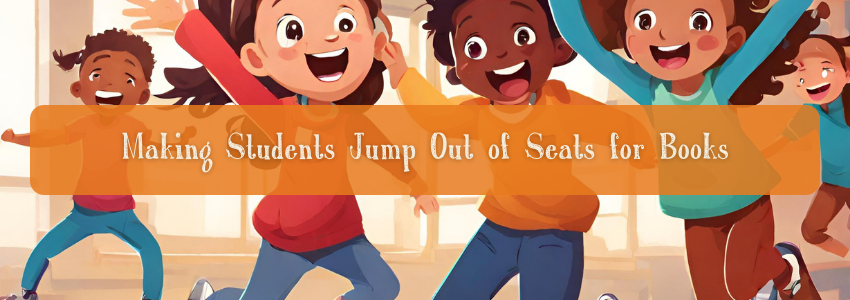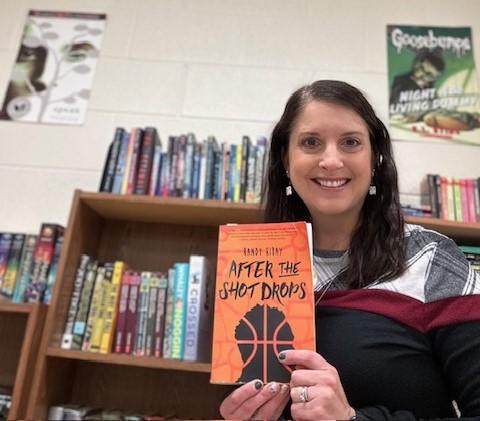

BLOGS > NOVEMBER 22, 2023
BY DR. KATIE HOVING

“Ooh! I know this!” Jaxon* cheered as he jumped out of his seat with his hand raised while simultaneously sharing his answer. While I could have criticized him for not waiting to be called on, how could I discourage a student from being so enthusiastic about the book we were reading—a high school boy with reading struggles, no less? Jaxon told the whole class, while still standing in the middle of the room, about how the main character in Randy Ribay’s After the Shot Drops switched to a new school to play basketball without telling his BFF and also started dating the girl his BFF was interested in.
Jaxon’s excitement to continue our read-aloud that day demonstrates that relatable, action-packed books can make a difference in a teen’s life. After the Shot Drops features teen characters, rocky relationships, and basketball. Yet, how does that help someone like Jaxon, a struggling reader, go from hating reading to jumping out of his seat in excitement over a book?

This past August, my co-teacher and I surveyed our sophomore English classes about their reading habits and preferences. Out of 67 responses, 76.6% of students said they either “rarely” or “never” enjoyed reading. 59% claimed they hadn’t enjoyed reading since either middle or elementary school. However, choice could make a difference: 83.6% of the students said they either “sometimes” or “always” prefer to choose the books they read. This has been confirmed by Scholastic Kids and Family Reading Report: 89% of kids ages 6–17 agree that their favorite books are the ones they pick themselves.
As a result, my co-teacher and I have an extensive classroom library—I think we last counted 16 bookshelves of all shapes and sizes—and all students have the opportunity to check out books whenever they desire. I’ve really tried my hardest to curate a collection that contains all genres and formats, and I’ve focused heavily on finding graphic novels, nonfiction, manga, and verse novels these past several years.
These books, it seems, have been very popular among my most reluctant and struggling high school readers. Hey Kiddo by Jarrett J. Krosoczka, New Kid by Jerry Craft, Crank by Ellen Hopkins, and The Crossover by Kwame Alexander have been consistently some of the most checked out. Do some kids ask to read Diary of a Wimpy Kid? Yep. And do I let them? Also yep!
I want my students to see that reading can be enjoyable, and if going back to a time when reading was fun is needed, then I’m all for it. Plus, this can lead to a later conversation where I challenge them to take a step further and read a graphic or verse novel. I also allow my students to read magazines and listen to audiobooks. Sometimes, it just takes baby steps.
Many ask how I grade my students on reading. If I’m being truly honest, I don’t do much. I simply grade them based on whether they are reading or not. I observe them during our three-day-per-week choice reading time, and I have them report what they are reading and what page number they are on when the time is done. When students finish a book, they also get a slip of paper. I then use these papers to create a chain for each class period; the class with the most books read on average per quarter gets a prize. Since most of my students come to me with an aversion to reading, just assigning more work to reading won’t help. Making reading time something that’s fun and low stakes tends to show them that reading doesn’t have to be tedious and stressful.
Another area in which I provide choice is through our class read-aloud. On Tuesdays and Thursdays, we begin class with a read-aloud of a popular YA title. I give a book talk of several options and allow my students to vote on which one they want me to read. Top choices for several years have been the following:
I have read many others as read-alouds before, but these are the titles that tend to get students hooked repeatedly while also generating thoughtful conversations. These read-alouds allow me to introduce books and authors my students may not have discovered on their own, and they allow us to develop a reading community where we can share in the joy of reading together. Again, no major strings are attached. Students will write a brief reflection after I read, sharing any thoughts they have from that day’s pages. These responses are then used as a springboard for our discussion.
In addition to independent reading and read-alouds, I also implement First Chapter Fridays in my reading intervention course to introduce the students to new titles, authors, and formats. My co-teacher and I create monthly bulletin boards to display books and encourage reading, and we display what we are currently reading in the classroom. When a student cannot find something to read they enjoy, I don’t give up. I do some research, contact the school librarian, or even go to the Industrial Arts department to find out what they read.
When all is said and done, it’s about making connections with our struggling and reluctant readers and learning about them as people. When I introduce books that connect to their interests or that they can find compelling and relatable, students are more likely to buy in. Even when student apathy and disinterest toward reading tend to get the best of me, I make sure to remember moments like Jaxon jumping from his seat to talk about a story. This reminds me that there’s hope and that placing the right book in a student’s life at the right time can make a world of difference.
Here is a Titlewave® list of the books loved by my students that I use for read-alouds in my class.
*not his real name

Dr. Katie Hoving
Reading Intervention and ELA Teacher
Hampshire High School, Community Unit School District 300
Dr. Katie Hoving has been a high school teacher for 17 years. She taught special education for 10 years with a focus on teaching reading and English. She earned her master’s degree in literacy from Judson University in 2009. Six years ago, she made the switch to teaching general education ELA, which allowed her to continue teaching kids who struggle, but on a grander scale while still having time for her family and for furthering her education. She completed her reading specialist endorsement in 2018, and she graduated with her doctorate in literacy in May 2022. Her research interests include motivating struggling learners, determining strategies for affective literacy, and keeping up with YA literature trends. Katie developed a framework for motivating readers who struggle, which calls for providing choice, relevance, interest, success, and peer interactions (CRISP) to teens in the classroom.
An Author Interview with Drew Daywalt
June 27, 2025
Drew Daywalt, award-winning author of the best-selling The Day the Crayons Quit series, is about to release his second middle grade book with illustrator Mike Lowery, No Sam! and the Meow of Deception. The title continues the hilarious adventures of Sam...
Read more
An Author Interview with Adam Wallenta and Makana Wallenta
June 27, 2025
Get ready to rock the galaxy with the first volume of Punk Taco – a wildly imaginative, music-fueled sci-fi adventure from father-son duo Adam and Makana Wallenta. Created when Makana was just five years old, this award-winning graphic novel now debuts...
Read more
An Author Interview with Lisa Manuzak Wiley
June 27, 2025
A bewitching new graphic novel series is arriving this fall!Author-illustrator Lisa Manuzak Wiley, who grew up in Hawaii, blends cozy fantasy, sisterhood, and tropical charm in a heartfelt homage to her roots: The Witches of Pepperwood Bay Vol. 1. Lisa...
Read more
What We're Reading – Books to Add to Your TBR List
June 4, 2025
As a Follett Content Outside Sales Consultant, I’m not only an avid reader, but also a passionate book reviewer! I’ve curated my top 10 book picks that are perfect for adding to your To Be Read (TBR) list. These titles...
Read more
Author Joseph Koszary on the Changes Made to the International Baccalaureate Extended Essay
May 22, 2025
As someone who’s served as an extended essay coordinator, examiner, and supervisor, I’ve grown deeply familiar with the previous incarnation of the extended essay (EE). Like many of you, years of accumulated experience have made supporting students through the process...
Read more
Celebrate Literacy All Year Long: Host an Online Book eFair!
May 12, 2025
Reading and literacy are essential parts of our lives, and there are numerous events throughout the year dedicated to celebrating and promoting these important skills. Hosting a Follett Book eFair is a fantastic way to engage your school community, share the...
Read more